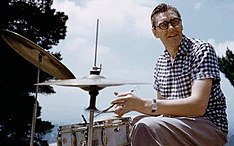Joe Dodge
| Joe Dodge | |
|---|---|
 |
|
| Background information | |
| Birth name | Joseph George Dodge |
| Born |
February 9, 1922 Monroe, Wisconsin, United States |
| Died | August 18, 2004 (aged 82) Lake Elsinore, California, United States |
| Genres | Jazz |
| Occupation(s) | Drummer |
| Associated acts | |
Joe Dodge (February 9, 1922 – August 18, 2004) was an American jazz musician.
A subtle and creative drummer, Dodge will probably always be better known for his role primarily as a timekeeper and accompanist who set a standard for blending propulsive swing, creating an adaptability that allowed him to remain in the background and not interfere with the soloist's line extended to a reluctance to take drum solos.
Born in Monroe, Wisconsin, Dodge was raised and grew up in San Francisco, California. Dodge initially studied to be a symphonic percussionist, but like many young drummers of his generation, he was primarily influenced by Gene Krupa and later listened Jo Jones, Jimmy Crawford and Shelly Manne, different sources of inspiration that helped him to create his own creative style.
During World War II, Dodge fulfilled his military duties from 1942 until 1945. While serving, he played drums in the Coast Artillery band, where he met tenor saxophonist Dave van Kriedt, who introduced him to Dave Brubeck and Paul Desmond. After demobilization in 1946, Dodge worked in several dixieland groups and dance bands around the Bay area.
In 1950, Dodge became tired of road touring and economic instability and was able to get a job working in a bank. Nonetheless, he still kept in touch with Desmond, who arranged for him to play an engagement in an octet led by Brubeck as a temporary replacement for drummer Cal Tjader. By then, the Brubeck octet was playing at the San Francisco Opera House, where they opened the show for Nat King Cole and Woody Herman.
...
Wikipedia
